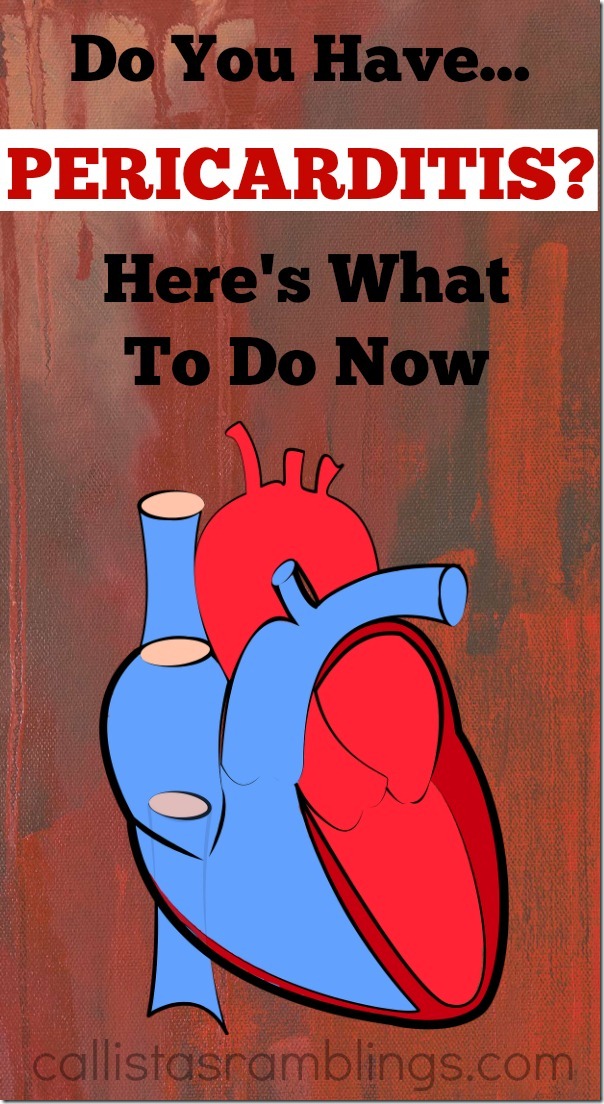If you have been diagnosed with Pericarditis and are looking for pericarditis tips you may be wondering what you should do to ensure good recovery and to help ease your pain. Here are some tips from someone who has been there.
Disclaimer: I am not a doctor or medical professional. This is not medical advice. This post is for informational purposes only. Consult a doctor or medical professional if you think you might have pericarditis or want to discuss a treatment option. If you have chest pain, call 911 or your equivalent emergency number immediately

What is Pericarditis?
Pericarditis is an inflammation of the pericardium which is the lining of your heart. When the linings are inflamed they rub together which causes chest pain. Chest pain is the main sign – specifically chest pain that eases when you lean forward and worsens when you lay back, sit back or breathe deeply. It also tends to worsen with movement.
However self-diagnosis is not recommended and if you have any chest pain, please get off the computer and call 911 or your emergency number immediately.
If however you’ve already been diagnosed with Pericarditis and are just looking for more information, this post is for you.
Pericarditis Basics (Tips Below)
If you’ve already been diagnosed hopefully your doctor has explained the basics to you but just in case here are the main symptoms and causes.
Possible Pericarditis Symptoms:
- Chest Pain (Often sharp stabbing pains but may also be a dull ache, burning, tightness or crushing feeling. Usually in the middle or to the left a bit.)
- Sometimes the pain goes to the shoulders.
- Fever (not all cases have fever but many do.)
- Weakness/Fatigue
- Trouble Breathing (in more severe cases)
- Palpitations
- Coughing (for some)
Causes of Pericarditis:
- Viral Pericarditis is caused by a virus
- Pericarditis can occur after a heart attack
- Disorders such as Lupus or Rheumatoid arthritis
- Trauma/Injury to heart or chest
- Disorders such as kidney failure, AIDS, tuberculosis and cancer
- Certain Medications (rare)
- Idiopathic (meaning they can’t find a cause and don’t know why)
Most cases are Viral or Idiopathic unfortunately.

Pericarditis Tips
Stay Calm. You may be convinced you are having a heart attack a few times even though you’ve been diagnosed. Know that pericarditis does NOT increase the chance of a heart attack. If you have pain that is different and DOES NOT GET BETTER OR WORSEN WITH A CHANGE OF POSITION then go to the hospital to get checked out. Most likely though it’s just the pericarditis getting more inflamed.
Keep track of your pain. Use an an app or a bullet journal, write on a calendar or use a plain old piece of paper on the fridge. If you can, write down two numbers: the lowest and highest the pain was that day. You’ll want to see for yourself if it’s getting better or worse but even more so, show the doctor if it’s getting better or worse.
Take your meds as prescribed. I know some people really don’t like taking medication but untreated pericarditis can cause serious complications. Don’t make it easier for these complications to happen by not taking your meds.
Rest. You don’t have to stay in bed all day but try not to lift anything heavier than 15lbs, bend over a lot (like picking toys up off the floor or gardening) or do something that gets you out of breath for too long (intimacy is fine, but no marathon training.) The more you do, the more it will hurt. Try to keep your heart rate under 100 if possible. The faster your heart beats, the more it hurts.
Ask your doctor questions. Don’t be afraid to ask questions, even if the doctor seems hurried. You have a right to quality health care. Questions you might want to ask include: Why do I have this? How long can I expect this to last? Will it come back? What if these meds don’t work? What tests should I be having? Your doctor may not fully know the answer to some of these (especially will it come back) but you still want to ask.
Join a support group. I’m a member of a Facebook Group for Pericarditis. Before I share with you, be warned that a lot of people in there have serious or chronic pericarditis (meaning it never goes away or it comes and goes a lot.). Lots of them have had the serious complications. This means that some of the posts can be scary. If reading about complications or people who have chronic pericarditis is going to make you WORSE, then stay away. If you are able to keep stress down and not fear the worst every time you are in the group, try it out, especially if this is not the first time you’ve had it or you’ve had it more than 6 months.

My Experience
I have chronic pericarditis. When I first wrote this post I had it once. Then I updated again when I had Pericarditis again. It’s a rare disease to begin with but even more rare to get it more than once. A small percentage of people develop chronic pericarditis.
It is painful to have Pericarditis and scary too because it’s so near your heart. It hurts to lay down and relax or to sleep. It hurts more in the car because I’m sitting straight up and being held that way by the seatbelt. Other things I have found that make it hurt more is house cleaning especially repeated bending over to pick things up.
The First Time
The first time I had it I was at the tail end of a bad virus when I woke up one day with intense chest pain. I kept putting off calling 911 (which I don’t recommend) but finally in the evening I called. At the hospital blood work confirmed I had a “marker” that shows something wrong with the heart. They did a chest xray and such and weren’t sure what the cause was so they sent me to the other local hospital which specializes in heart diseases.
Over there a cardiologist listened to my heart and diagnosed me immediately. He said it was rare which is why the other hospital didn’t know it was that. When he listened to my heart he hear the “pericardial rub” which is the sound of the linings rubbing together.
I was in CCU (Cardiac Care Unit) for 2 days while they did more tests and gave me meds and then sent me home with two medications, Ibuprofen and Colchicine. The Colchicine helps with the inflammation in a different way than the Ibuprofen and was supposed to also decrease the chances of it coming back. A few weeks later I was feeling better.
The Second Time
This time around I had no virus but woke up with chest pain again. I tend to get chest pain from costochondritis sometimes too (inflammation of chest wall) so I waited a few days to see if it would go away. It got worse. I was using Naproxen to help with the pain. It took me another week to get to the cardiologist who confirmed it had come back. I was given the same meds again and yesterday I ran out of the ibuprofen and the pain became intense and I was dizzy and nauseous.
I went to the emergency room to get checked out. Tests didn’t show any of the severe complications (Pericardial Effusion – excess fluid in the pericardium or Constrictive Pericarditis – Pericardium has scarring build up which stops heart from working properly) so I was given prednisone (steroids) to help make it go away. I did an echocardiogram (ECG) shortly after that and then followed up with the doctor after that. I was still having daily pain but it had gotten much better during the week of my ECG and then was worsening again the week of my follow-up.
It has now been almost 3 months since my second round of Pericarditis. I still get a little pain almost daily but it’s rarely above a 3 (out of 10) and most of the time is 0-2. I am on colchicine still and I got more ibuprofen to take as needed but I try to only take it when it’s a 3 or above. I am also taking a med to coat my stomach and protect it from all these meds. I go back in another month and a half for follow-up to see if it’s gone.
Chronic Pericarditis
It never fully went away after the second time and became recurrent where it would come and go. For the last year or two it’s been chronic. This means it hurts a little bit each day. I just ignored it for a long time (again, not recommended.) I also had been having joint pain for a while so I saw a Rheumatologist who was concerned about my pericarditis. She sent me to a new cardiologist who did an ECG and Echocardiogram and put me on prednisone (steroids), colchicine and Naproxen plus a stomach protector med. As of this writing I’m slowly tapering off the steroids and I will be continuing the colchicine for 18 months. We will see if it makes a difference. Mostly likely my pericarditis is related to the autoimmune disorder I have (no specific diagnosis yet.)
I hope these Pericarditis tips have been helpful.
Related: My Niece’s Heart Surgery at 3 Years Old
Take Care of Yourself!




Speak Your Mind